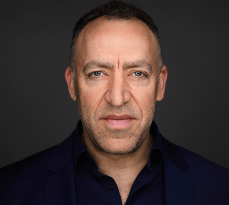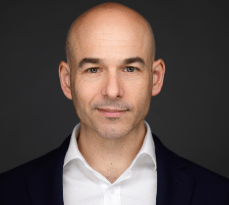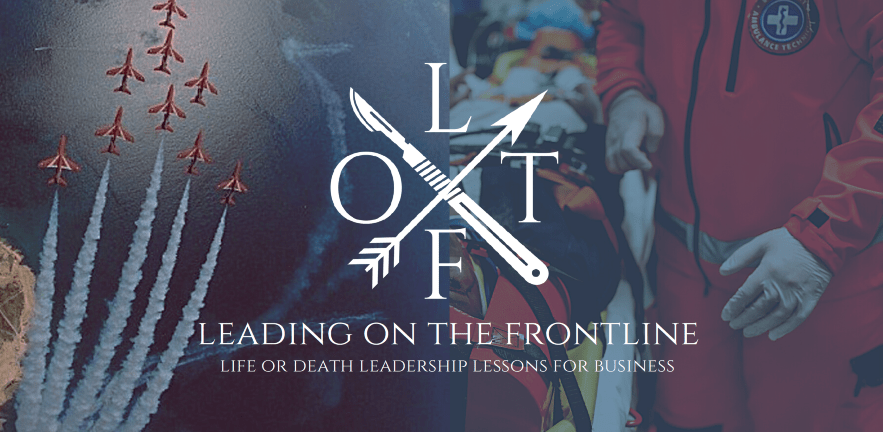Leading on the Frontline founders and Cambridge Judge Business School graduates tell of the trials and successes of setting up a new venture while undertaking their degree and working full-time.
The word ‘frontline’ has never been more prominent. Throughout the past few years, we’ve only heard short tales of these workers and their sacrifices. But what does it really mean to work on the frontline, and what lessons can be learnt from these high-performing teams and individuals?
Teaching leaders to make extreme pressure decisions

James Risley and Christian Gleave, Executive MBA 2020 graduates, have started a business venture called Leading on the Frontline. Their venture is a consultancy which inspires and enables leaders to make decisions at times of extreme pressure, stress and crisis. Using lessons learnt from ‘life or death’ decision-making, they unlock peak performance within both organisations and individuals.
Christian is a former Royal Air Force (RAF) fighter pilot who deployed to multiple operational conflicts in the Harrier Jump Jet (GR7/9), flew from both land bases and aircraft carriers and is a former member of the elite RAF Aerobatic Team, The Red Arrows. As a Group Captain, he provided strategic advice to the US Air Force Chief of Staff from inside the Pentagon. Leaving the RAF after 26 years of active service, he successfully transitioned to becoming Executive Director of a private equity-funded aerospace company in London, providing specialist air and space solutions to governments all over the world.
James initially trained as a surgeon before specialising in Emergency Medicine. A law graduate and Emergency Medicine Consultant, he subsequently moved into corporate healthcare leadership roles helping to deliver patient care at an organisational level. James has led many healthcare and frontline teams during his career, rising to the challenge of the pandemic while undertaking his Executive MBA.

Christian and James met early during the EMBA programme, and quickly determined they had a natural affinity in their purposefulness, directness, approach to life, and achievements. The more they spoke, the more they recognised the value of their experiences and how the comparison of their professions was an interesting one.
“When Christian was asked to talk about leadership to the cohort, he thought a comparative, joint talk that considered the similarities and differences between medical and military leadership would add huge value. The feedback we received was very positive, with strong recommendations to talk professionally about this valuable subject, and from there Leading on the Frontline was born,” James said.
Setting up a venture while working and studying
Establishing a new company while undertaking a postgraduate qualification and working full-time proved challenging. They explained that “the hardest part was taking the leap into the unknown when you already have huge demands on your time and how, with the right team, decision-making can be both agile and responsive. From the outset, we had a clear and shared vision of what service we wanted to provide and recognised the inherent value of our own real-world experiences”.
They went on to explain that unexpected events during the course placed additional pressures on their time:
“Twenty months is a long time and unexpected things inevitably happen during the programme. Promotions, pandemics, career transitions, house moves, children… and this is before the many desirable, ad-hoc opportunities during the programme.”
“Being able to adapt as the programme progressed, re-frame, prioritise and achieve our goals has been somewhat of a time-management challenge, but one common to all successful businesses. Now that the EMBA is over, we’re looking forward to stress-testing academic principles against the reality of frontline operations.”
How the Cambridge EMBA programme aided the new venture
The Executive MBA has helped them with their new venture. It has provided them with a fantastic network of friends and professionals, an open environment for testing ideas, and the opportunity for lifelong learning:
“The EMBA immerses the individual in an environment that accepts and encourages ‘failing forwards’ which, when coming from the cut and thrust of military and emergency medicine life, can feel both liberating and empowering,” Christian said. “Cambridge and the University provide such a rich ecosystem of people and teams who have experienced the same trials and tribulations of starting a business, and who are happy to share their time, insights, and advice,” James added.
A high-pressure management framework and a podcast for leaders
Christian and James have created a specialist framework for Leading on the Frontline as part of their leadership talks, as well as now producing podcasts and intend to publish a book. The P.E.R.FORM framework, which stands for ‘Prepare, Execute, Recover, FORM (wellbeing and health)’, brings together the key elements of Christian and James’ recommendations for business, sharing both their perspectives on success and failure and how to learn from them.
“Our framework captures how to manage both yourself, your team and importantly, your business in times of acute stress and crisis. The ‘Prepare, Execute, Recover (P.E.R)’ part covers the initial actions, and ‘FORM’ provides more of a business health check. “COVID-19 has proved more than any other factor in the last two years that individual, team and business wellbeing is critical to a business’ sustained success”, says Christian.
The podcast series is predominantly aimed at leaders, reflecting on specific real-life experiences of others, and gleaning the most important lessons for business. The book will compare frontline medical and military leadership. By highlighting both successes and failures of leadership from real-life critical scenarios, the book will elicit the lessons directly applicable to a business.
Cambridge Judge Business School and you: a life-long relationship
“The relationship you form with Cambridge Judge Business School is a life-long one, from which you can derive great strength, confidence, and a feeling of support. We have finished the Executive MBA with a feeling that this is not the end, but just the beginning” James and Christian agreed.


